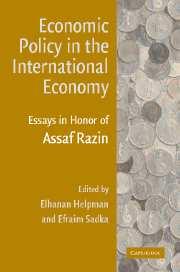Book contents
- Frontmatter
- Contents
- List of Contributors
- Preface
- Introduction
- PART ONE FINANCIAL ISSUES IN OPEN ECONOMIES: THEORY
- 1 Crises: The Next Generation?
- 2 Solutions (?) to the “Devaluation Bias”: Some Preventive Measures to Defend Fixed Exchange Rates against Self-Fulfilling Attacks
- 3 Growth-Enhancing Effects of Bailout Guarantees
- 4 Risk and Exchange Rates
- PART TWO FINANCIAL ISSUES IN OPEN ECONOMIES: EMPIRICS
- PART THREE ECONOMIC GROWTH: THEORY AND EMPIRICS
- PART FOUR PUBLIC ECONOMICS
- PART FIVE POLITICAL ECONOMY
- Author Index
- Subject Index
2 - Solutions (?) to the “Devaluation Bias”: Some Preventive Measures to Defend Fixed Exchange Rates against Self-Fulfilling Attacks
Published online by Cambridge University Press: 03 November 2009
- Frontmatter
- Contents
- List of Contributors
- Preface
- Introduction
- PART ONE FINANCIAL ISSUES IN OPEN ECONOMIES: THEORY
- 1 Crises: The Next Generation?
- 2 Solutions (?) to the “Devaluation Bias”: Some Preventive Measures to Defend Fixed Exchange Rates against Self-Fulfilling Attacks
- 3 Growth-Enhancing Effects of Bailout Guarantees
- 4 Risk and Exchange Rates
- PART TWO FINANCIAL ISSUES IN OPEN ECONOMIES: EMPIRICS
- PART THREE ECONOMIC GROWTH: THEORY AND EMPIRICS
- PART FOUR PUBLIC ECONOMICS
- PART FIVE POLITICAL ECONOMY
- Author Index
- Subject Index
Summary
Introduction
Research on currency crises has largely been focused on their economic causes – in particular, the role of fundamentals versus self-fulfilling expectations. [See, e.g., Krugman (1979, 1998, 1999, 2001) and Obstfeld (1986, 1994, 1996).] Some attention has recently been directed to the defense of fixed exchange rates against speculative attacks in particular and the prevention of financial crises in general. [See, e.g., Ozkan and Sutherland (1995), Drazen (1999), Flood and Jeanne (2000), and Lahiri and Végh (2000).] Attacks arising from “wrong” fundamentals such as the policy inconsistency in first-generation crisis models of Krugman (1979) and Flood and Garber (1984) are simply unavoidable. The only way to prevent them is to “correct” such fundamentals through, say, better and more consistent coordination of policy actions among different branches of the government. On the other hand, attacks arising from self-fulfilling expectations as in second-generation models of Obstfeld (1996) and in third and fourth-generation models of Krugman (1999, 2001) are in principle avoidable – if, somehow, such expectations can be altered or eliminated by appropriate preventive measures. As Krugman (2001) makes clear, younger (third and fourth) generation models of financial crises based on, say, financial fragility and balance sheet effects – where asset prices other than exchange rates have a more prominent role to play – need not have much to do with currency crisis per se. In this paper, we shall focus on the analysis of the prevention of self-fulfilling currency attacks of the kind examined in second-generation models, and ignore other types of self-fulfilling crises.
- Type
- Chapter
- Information
- Economic Policy in the International EconomyEssays in Honor of Assaf Razin, pp. 33 - 51Publisher: Cambridge University PressPrint publication year: 2003
- 1
- Cited by



